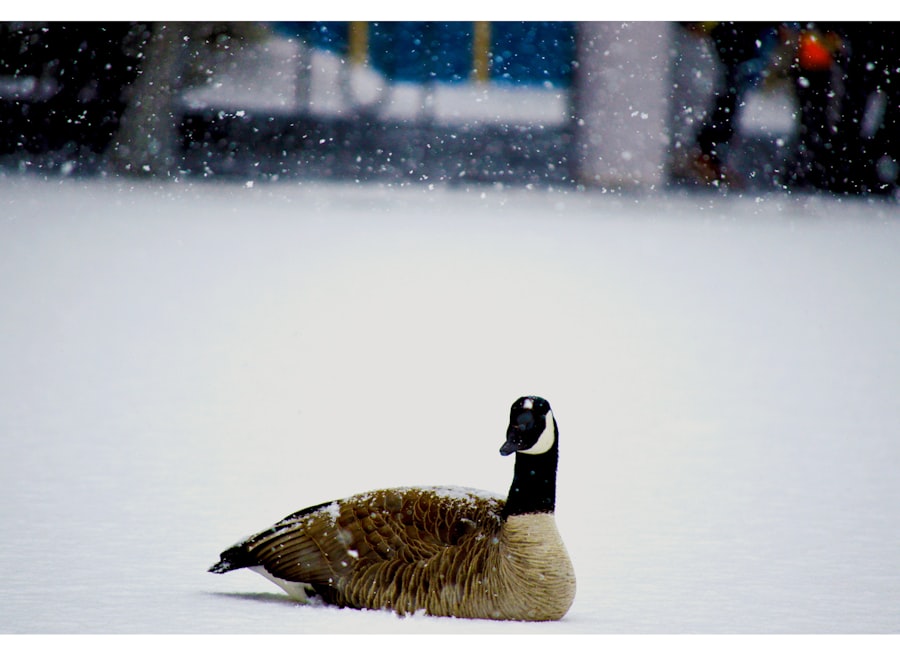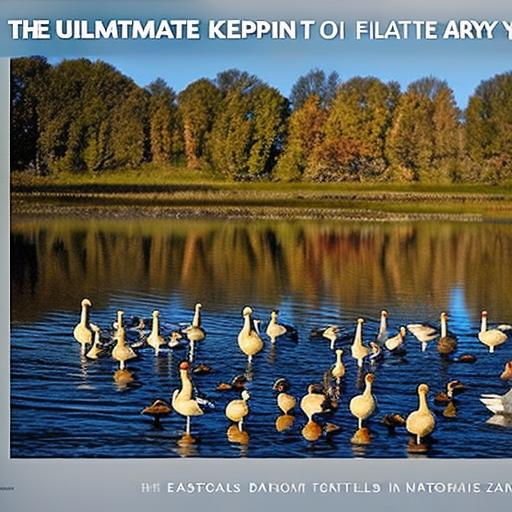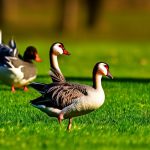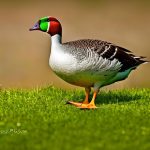Geese are beautiful creatures that can often be found near bodies of water, such as ponds, lakes, and rivers. While they may be a sight to behold, they can also become a nuisance for many property owners. Geese can cause a variety of problems, including property damage and health hazards. They are known to leave droppings everywhere they go, which can be unsightly and difficult to clean up. In addition, their droppings can carry bacteria and parasites that can pose a risk to human health. Geese can also cause damage to lawns and gardens by trampling on plants and eating crops. Understanding geese behavior and implementing effective deterrent methods is essential for managing these issues.
Key Takeaways
- Geese can be a nuisance due to their droppings, noise, and aggressive behavior.
- Understanding geese behavior can help in finding effective ways to deter them.
- Natural ways to deter geese include planting certain vegetation and using decoys.
- Installing physical barriers like fences and netting can also keep geese away.
- Using sound and light devices can be an effective way to repel geese.
Understanding geese behavior
Geese are attracted to certain areas for several reasons. They are social animals and are often drawn to areas where other geese are present. They also prefer areas with easy access to food and water sources. Geese communicate with each other through vocalizations and body language. They use honking sounds to communicate danger or to signal their presence to other geese. Understanding these behaviors is crucial in effectively deterring geese from your property.
Natural ways to deter geese
There are several natural ways to deter geese from your property. One method is to plant certain types of vegetation that geese find unappealing. For example, geese dislike tall grasses and plants with prickly leaves. By planting these types of vegetation near areas where geese tend to congregate, you can discourage them from staying on your property.
Another natural deterrent is the use of decoys. Geese are territorial animals and will avoid areas where they see other geese already present. By placing decoys in strategic locations, you can create the illusion of a populated area and deter geese from settling in.
It is important to regularly change these natural deterrent methods to prevent geese from becoming accustomed to them. Geese are intelligent animals and can quickly adapt to their surroundings. By changing the vegetation or moving the decoys periodically, you can maintain their effectiveness.
Installing physical barriers
Physical barriers can be highly effective in keeping geese away from certain areas. Fences or netting can be installed to create a physical barrier that prevents geese from accessing your property. When choosing a barrier, it is important to consider the specific needs of your property. For example, if you have a large open area, a fence may be more suitable. If you have a smaller garden or pond, netting may be a better option.
It is important to ensure that the physical barrier is properly installed and maintained. Geese are persistent animals and will try to find ways around or under barriers. Regularly inspecting and repairing any damage to the barrier will help ensure its effectiveness.
Using sound and light to repel geese
Sound and light can be effective deterrents for geese. There are devices available that emit sounds or lights that are unpleasant to geese and can drive them away. For example, there are devices that emit high-frequency sounds that are only audible to geese, causing them discomfort and encouraging them to leave the area.
Similarly, there are devices that emit bright lights or lasers that can startle and deter geese. These devices can be placed strategically around your property to create an uninviting environment for geese.
Keeping geese away from gardens and crops

Gardens and crops are particularly vulnerable to damage from geese. To protect your plants, you can use netting or fencing to create a physical barrier around the area. Netting should be securely fastened to prevent geese from getting underneath it.
Regularly checking for damage and making necessary adjustments is crucial in keeping geese away from gardens and crops. Geese are persistent and will continue to try to access the area if they find a way in. By promptly repairing any damage and reinforcing the barriers, you can effectively protect your plants.
Creating an uninviting environment for geese
Making your property less attractive to geese is an important step in deterring them. Removing sources of food or water can discourage geese from settling in. For example, if you have a pond or lake on your property, consider installing a fountain or aerator to create movement in the water. Geese prefer still water and will be less likely to stay if there is movement.
Keeping your property clean and well-maintained is also important in discouraging geese. Remove any fallen fruit or seeds that may attract them. Regularly mow your lawn and trim vegetation to make it less appealing for geese to graze.
Training geese to avoid certain areas
Geese can be trained to avoid certain areas using visual or auditory cues. For example, you can use scare devices, such as flags or balloons, to create movement and noise that will startle geese and encourage them to stay away.
Another method is the use of trained dogs. Border collies are particularly effective in herding geese away from specific areas. The presence of a dog can create a natural deterrent for geese.
Seeking professional assistance
In some cases, it may be necessary to seek professional assistance to manage a large-scale infestation of geese. Professional wildlife management companies have the expertise and resources to effectively deter geese from your property. When choosing a professional, it is important to do your research and select a reputable company with experience in managing geese.
A professional wildlife management company will assess your property and develop a customized plan to address the specific issues you are facing. They may use a combination of deterrent methods, such as physical barriers, sound devices, and trained dogs, to effectively manage the geese population.
Conclusion and final tips for keeping geese away
In conclusion, geese can be a nuisance for property owners, causing damage and health hazards. Understanding geese behavior and implementing effective deterrent methods is essential in managing these issues. Natural deterrents, such as planting certain types of vegetation or using decoys, can be effective in keeping geese away. Physical barriers, sound devices, and trained dogs can also be used to deter geese. Regularly checking for damage and making necessary adjustments is important in protecting gardens and crops. Creating an uninviting environment by removing sources of food or water and keeping your property clean can discourage geese from settling in. Training geese to avoid certain areas using visual or auditory cues can also be effective. In some cases, seeking professional assistance may be necessary to manage large-scale infestations of geese. By being persistent and consistent in your efforts, you can effectively keep geese away from your property.
If you’re looking for effective ways to keep geese away from your property, you may also be interested in learning about creating a secure and predator-proof chicken coop. A well-designed coop not only provides a safe haven for your chickens but can also help deter unwanted visitors like geese. Check out this informative article on poultrywizard.com that offers valuable insights and ideas on chicken coop interior design: https://poultrywizard.com/keeping-chickens/chicken-coop-interior-ideas/. Additionally, if you’re considering building or purchasing a new coop, this article on the best types of coops for chickens: https://poultrywizard.com/keeping-chickens/what-kind-of-coop-is-best-for-chickens/ and this one on a charming farmhouse-style chicken coop: https://poultrywizard.com/keeping-chickens/farmhouse-chicken-coop/ can provide you with useful guidance.
FAQs
What are some effective ways to keep geese away?
There are several effective ways to keep geese away, including using decoys, installing fencing, using repellents, and modifying the landscape.
What are some natural repellents that can be used to keep geese away?
Some natural repellents that can be used to keep geese away include grape concentrate, garlic, and hot pepper.
What are some non-lethal methods of keeping geese away?
Some non-lethal methods of keeping geese away include using noise deterrents, installing visual deterrents, and modifying the landscape.
What are some visual deterrents that can be used to keep geese away?
Some visual deterrents that can be used to keep geese away include reflective tape, scarecrows, and predator decoys.
What are some noise deterrents that can be used to keep geese away?
Some noise deterrents that can be used to keep geese away include air horns, whistles, and propane cannons.
What are some modifications that can be made to the landscape to keep geese away?
Some modifications that can be made to the landscape to keep geese away include removing food sources, installing barriers, and planting unpalatable vegetation.
Meet Walter, the feathered-friend fanatic of Florida! Nestled in the sunshine state, Walter struts through life with his feathered companions, clucking his way to happiness. With a coop that’s fancier than a five-star hotel, he’s the Don Juan of the chicken world. When he’s not teaching his hens to do the cha-cha, you’ll find him in a heated debate with his prized rooster, Sir Clucks-a-Lot. Walter’s poultry passion is no yolk; he’s the sunny-side-up guy you never knew you needed in your flock of friends!







